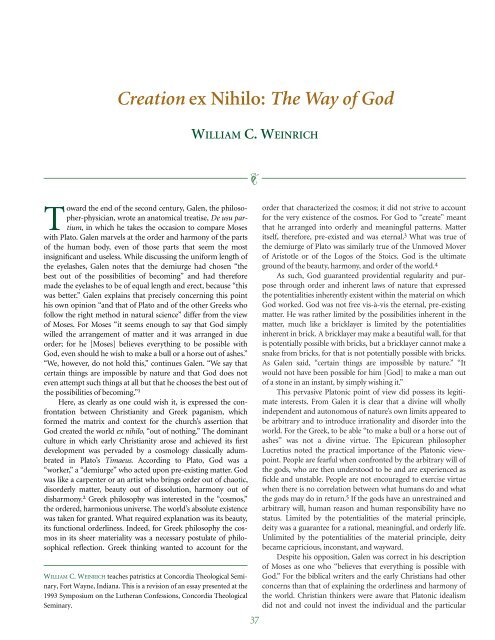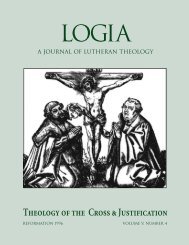Creation ex Nihilo: The Way of GodWILLIAM C. WEINRICHToward the end of the second century, Galen, the philosopher-physician,wrote an anatomical treatise, De usu partium,in which he takes the occasion to compare Moseswith Plato. Galen marvels at the order and harmony of the partsof the human body, even of those parts that seem the mostinsignificant and useless. While discussing the uniform length ofthe eyelashes, Galen notes that the demiurge had chosen “thebest out of the possibilities of becoming” and had thereforemade the eyelashes to be of equal length and erect, because “thiswas better.” Galen explains that precisely concerning this pointhis own opinion “and that of Plato and of the other Greeks whofollow the right method in natural science” differ from the viewof Moses. For Moses “it seems enough to say that God simplywilled the arrangement of matter and it was arranged in dueorder; for he [Moses] believes everything to be possible withGod, even should he wish to make a bull or a horse out of ashes.”“We, however, do not hold this,” continues Galen. “We say thatcertain things are impossible by nature and that God does noteven attempt such things at all but that he chooses the best out ofthe possibilities of becoming.” 1Here, as clearly as one could wish it, is expressed the confrontationbetween Christianity and Greek paganism, whichformed the matrix and context for the church’s assertion thatGod created the world ex nihilo, “out of nothing.” The dominantculture in which early Christianity arose and achieved its firstdevelopment was pervaded by a cosmology classically adumbratedin Plato’s Timaeus. According to Plato, God was a“worker,” a “demiurge” who acted upon pre-existing matter. Godwas like a carpenter or an artist who brings order out of chaotic,disorderly matter, beauty out of dissolution, harmony out ofdisharmony. 2 Greek philosophy was interested in the “cosmos,”the ordered, harmonious universe. The world’s absolute existencewas taken for granted. What required explanation was its beauty,its functional orderliness. Indeed, for Greek philosophy the cosmosin its sheer materiality was a necessary postulate of philosophicalreflection. Greek thinking wanted to account for theWILLIAM C. WEINRICH teaches patristics at Concordia Theological Seminary,Fort Wayne, Indiana. This is a revision of an essay presented at the1993 Symposium on the Lutheran Confessions, Concordia TheologicalSeminary.37order that characterized the cosmos; it did not strive to accountfor the very existence of the cosmos. For God to “create” meantthat he arranged into orderly and meaningful patterns. Matteritself, therefore, pre-existed and was eternal. 3 What was true ofthe demiurge of Plato was similarly true of the Unmoved Moverof Aristotle or of the Logos of the Stoics. God is the ultimateground of the beauty, harmony, and order of the world. 4As such, God guaranteed providential regularity and purposethrough order and inherent laws of nature that expressedthe potentialities inherently existent within the material on whichGod worked. God was not free vis-à-vis the eternal, pre-existingmatter. He was rather limited by the possibilities inherent in thematter, much like a bricklayer is limited by the potentialitiesinherent in brick. A bricklayer may make a beautiful wall, for thatis potentially possible with bricks, but a bricklayer cannot make asnake from bricks, for that is not potentially possible with bricks.As Galen said, “certain things are impossible by nature.” “Itwould not have been possible for him [God] to make a man outof a stone in an instant, by simply wishing it.”This pervasive Platonic point of view did possess its legitimateinterests. From Galen it is clear that a divine will whollyindependent and autonomous of nature’s own limits appeared tobe arbitrary and to introduce irrationality and disorder into theworld. For the Greek, to be able “to make a bull or a horse out ofashes” was not a divine virtue. The Epicurean philosopherLucretius noted the practical importance of the Platonic viewpoint.People are fearful when confronted by the arbitrary will ofthe gods, who are then understood to be and are experienced asfickle and unstable. People are not encouraged to exercise virtuewhen there is no correlation between what humans do and whatthe gods may do in return. 5 If the gods have an unrestrained andarbitrary will, human reason and human responsibility have nostatus. Limited by the potentialities of the material principle,deity was a guarantee for a rational, meaningful, and orderly life.Unlimited by the potentialities of the material principle, deitybecame capricious, inconstant, and wayward.Despite his opposition, Galen was correct in his descriptionof Moses as one who “believes that everything is possible withGod.” For the biblical writers and the early Christians had otherconcerns than that of explaining the orderliness and harmony ofthe world. Christian thinkers were aware that Platonic idealismdid not and could not invest the individual and the particular
38 LOGIAwith intrinsic meaning and significance. Individual appearancesmay be part of an overarching order and harmony, but they haveno intrinsic meaning apart from that ordered whole. For theancient cosmologists, individual and particular existence wasessentially ephemeral and shadowy. It had no purpose, and it hadno destiny. Particular existence, considered in relation to theordered whole, was considered insignificant and could even takeon tragic proportions. Faced by impersonal forces and merely amember of an ordered nature, particular existence, strictly speaking,had no future. Having no intrinsic being, particular existencewas given to death and corruption. Characterized by absolute“becoming,” individual existence experienced death as naturallyas it possessed life. Given to change, it was in perpetual corruption.It is no accident, therefore, that the Epicureans came to theconclusion that the world was a random movement of atoms andpossessed no inherent purpose. Nor is it accidental that Greekphilosophy, when confronted by the more pessimistic philosophiesof the Near East, developed into Gnostic and Manichaeandenials of the goodness of the material world.The assertion of the creatio ex nihilo isnot primarily a statement about thefirst moment of the world’s existence.nbIt is a matter of some debate whether biblical and intertestamentaltexts provide an unambiguous assertion of the creatio exnihilo. It is sometimes asserted that 2 Mc 7:28 makes such a claim,but that may be doubted. 6 The Wisdom of Solomon, while writingagainst the fatalistic view that the world was created bychance, nonetheless can still make use of Plato’s formula that Godcreated the world from “formless matter.” 7 The Jewish philosopherPhilo never transcends a pure Platonism in this question.Second-century Christian apologists, such as Justin Martyr, alsomake ample use of Plato’s Timaeus. 8In confrontation with Platonic dualism and its understandingof the relationship between God and the world, however, second-centuryChristian thinkers are clearly developing an explicitdoctrine of the creatio ex nihilo. Their primary interest is to assertthe omnipotence and freedom of God. God created the worldand all that exists “from nothing,” and this he did by will andcommand. It is important to note that in this the Christians didnot merely proffer an alternative explanation of the world’s originsand its order. They were not describing how the world cameinto existence, so that the world, as effect, might be understoodby its cause, God. Were that the case, the Christians would simplyhave remained within the parameters of Greek philosophy, whichsought to explain the operations of the world by delineating therelation between the effecting active principle and the effectedpassive principle.It was perhaps Tatian who first expressly asserted that Godoriginated matter. God brings forth the unformed matter ofPlato; it is the Logos who gives form and order to this materialchaos. 9 In Theophilus of Antioch we find an explicit counterpointto Plato. The sovereign will of God alone is the basis of creation.Had God simply made the world out of pre-existing matter,he would be no greater than a mere handworker. But God’spower is manifested in that he makes what he wills “out of nothing.”10 It is evident in this argument of Theophilus that the“unformed, pre-existing matter” upon which the Platonic demiurgeworks has been replaced by the will of God. While the Greekdemiurge created “out of unformed matter,” the biblical God created“out of nothing,” that is, by his will and command. ForTheophilus, this willing into existence of that which was inabsolute non-existence establishes the monarchy, the singularrule, of God. God’s sole rule is manifested in that he alone is“unbegotten” and calls all matter into existence. More explicit yetis Irenaeus. He excludes any notion of pre-existing matter by sayingthat God took “from himself the substance of the creatures,and the patterns of things made, and the type of all the ornamentsin the world.” 11Clearly to be noted in all of this is that the assertion of thecreatio ex nihilo is not primarily a statement about the firstmoment of the world’s existence. It does not merely indicate thatthe world, having had absolutely no existence, was once broughtinto existence. Creatio ex nihilo is not pure protology, a statementabout the world’s beginning. It is first and foremost a statementabout God and how he relates to the world at all times and in allplaces. Creatio ex nihilo is also a statement about the nature of thecreature and how it relates to God the Creator at all times and inall places. In short, the creatio ex nihilo makes the necessary distinctionbetween God and the creature, especially man. Irenaeusmakes this precise point: “While men, indeed, cannot make anythingout of nothing, but only out of matter already existing, yetGod is in this point pre-eminently superior to men, that he himselfcalled into being the substance of his creation, when previouslyit had no existence.” 12 Luther would later make the samepoint: “He [God] and he alone made all things from nothing.” 13Let us expand upon the importance of this point.The Scriptures begin with the one almighty God of grace.We are told that “in the beginning God created the heavens andthe earth” (Gn 1:1). In biblical usage, the word for “create” (ar:B;),always has God as its subject. It lays special emphasis on thetotally free character of God’s creating. This “interest” of the wordar:B; corresponds to the interest of the early Christian doctrine ofcreatio ex nihilo, which likewise intended to proclaim the absolutefreedom of God vis-à-vis the world. God created “from nothing.”This “nothing” was not thought to be some kind of void intowhich God placed a positive and material existence. This “nothing”was not thought to be some kind of something outside ofGod from which or upon which God acted. This “nothing” wassimply thought to be the sovereign will of God. To say that Godcreated ex nihilo was to say that he created by will and command.Nothing preceded God’s will to create; nothing external to Godmoved him or required him to create. God freely willed to createthe world, and the world came into existence and exists purely onthe basis of God’s willing command, “Let there be!” God himself,therefore, is utterly autonomous and independent of the worldand relates to the world only as the one who wills to create it. Godrelates to the world, not as Highest Being—that is Greek thought.
















